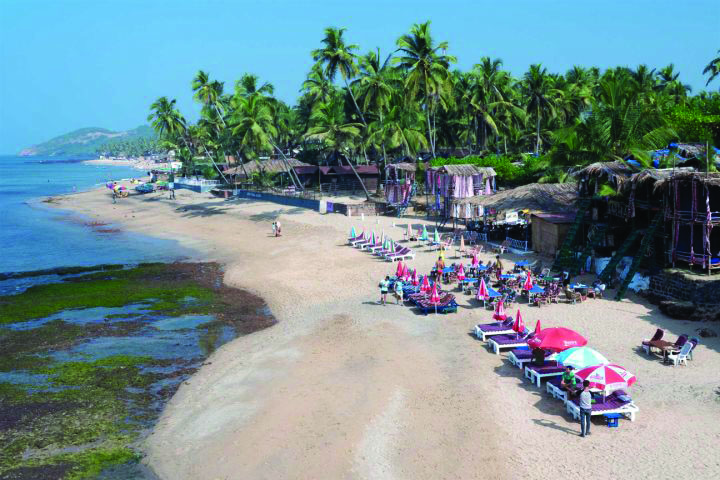Goa is abuzz with excitement as vintage bike and car owners, users, collectors and fans are decking […]

NGT REFUSES TO CLEAR SHACKS ON THE BEACHES!
Sept 28- Oct 04 2019, Stray Thoughts September 27, 2019DELAYED: Shacks are popular with tourists and locals alike, although they often charge as much as regular restaurants
BY RAJAN NARAYAN
And a few stray thoughts for yet another Saturday. For a Saturday following the week when closure of Thomas Cook UK left six lakh passengers stranded all over the world. For a Saturday following the week when in a double tragedy the State government has refused to allot shacks on Goa’s beaches till the states submits its Coastal Management Regulation Plan. For a Saturday following the week when there was utter and total confusion over the future of the Mapusa and Margao Co-operative Banks. For a Saturday following the week when the hopes of resuming mining income in a small way by way of sale of material from dumps also does not have any support from the Central government. For a Saturday following the week when the hospitality industry benefited from the cut backs in GST but the state itself fell short of its target.
TOURISM AFFECTED
And a few stray thoughts on Goa tourism being further affected by the closure of Thomas Cook UK.
On an average Thomas Cook UK has been bringing 50,000 or more charter tourists to Goa in recent years. The sudden closure of Thomas Cook just on the verge of the commencement of the season in October means Tourism Day, September 27, is bleak. Traditionally the first charter of Thomas Cook UK lands in early November. The charters booked through Thomas Cook Private Limited will lose their money unless alternate arrangements are made by other airlines like Air India. This will have a cascading effect on hotels and out bound tours which the charter tourists may organise.
In fact, the closure of Thomas Cook UK is an ideal opportunity for Air India to revive itself and replace Thomas Cook as the principle charter operator from the UK to India. As it is there was a fall in demand for charters to India because of the confusion in the UK over BREXIT. Many tourists from the UK who come to Goa during the season, including Christmas and New Year, are UK citizens of Goan origin. With their status as citizens of UK being in doubt, no one wants to leave the UK in the present circumstances. Hopefully the confusion over BREXIT will be sorted out now that the UK Supreme Court has refused permission to shut down Parliament in the UK.
This is been a bad season for Goan tourism. The first to close down was Finnair which brought tourists from Sweden and Switzerland to Goa. The first charter operator, Condor, which began functioning in 1984 (soon after the Commonwealth Heads of Government Meeting (Chogm) in November ‘83 in Goa), announced that it was withdrawing its flights from this year.
There is uncertainty over the future of Russian charter operators. Russians have recently emerged as the largest group of tourists from any country. They are more popular than tourists from the UK as they are more generous and spend more money than the middle class and lower middle class tourists. Traffic from the UK has also been impacted by reports of attacks on women. The recently concluded Scarlet Keeling case brought safety issues back into the spotlight when the main accused was sentenced to ten years.
It must be made very clear that it is Thomas Cook UK which has closed down and not Thomas Cook India. These are two separate companies and their managerial controls are also different. Thomas Cook UK primarily deals in charters, while Thomas Cook India is involved in money exchange and inbound tours in India. There may not be a major impact on employment in India following the closure of Thomas Cook UK though the ground handling staff will be affected.
SHACKS DELAYED
In yet another shock for the Tourism Industry the government has made it clear that shacks on public property will not be cleared till Goa submits its Coastal Management Zone Plan.
Under the Coastal Zone Regulation Act every state has to file its Coastal Zone Management Plan (CZMP) which defines if construction can be carried out within 200 metres of the high tide line (HTL). The Coastal Zone Management Authority (CZMA) also has detailed rules on possible damage to mangroves and salt pans while giving permission for development. The apex authority for permissions under the Coastal Regulation Zone Act is the National Green Tribunal which is presided over by a Supreme Court judge in Delhi. The NGT had fixed August 15 as the deadline for States to submit their coastal management plan to decide on granting developmental permission off rivers and seas. The Goa government committed to submitting its plan by August 15 but failed to do so even by September 5. The new deadline fixed is November 15 by which time half the tourism season will be over.
Every year on an average the Tourism Department, subject to the permission to the NGT, has been allotting an average of 350 shacks. The majority of shacks are in North Goa. Shacks on private property are excluded from the NGT rules.
There have been persistent complaints that many Goan shack owners lease out their shacks to outsiders who engage in illegal activities. Apart from the historical complaints about shacks peddling drugs there is been a new sensational accusation. There’s been a post on Facebook advertising a nude party at Morjim. The police claim they have the names of both the Delhi and local organisers of the nude party to be held in Morjim in October.
There have been other complaints about beaches becoming increasingly unsafe for foreign tourists. Over the last decade there have been over a hundred deaths or disappearances of foreign tourists from Goan beaches. Part of the problem is that the approach roads to the beaches are very dimly lit which makes women travelling on them vulnerable to rape and even murder. The Drishti teams of the life guards normally shut shop by 7 pm at the latest. So much so there is no security on many of the beaches. The talk of providing changing rooms and toilets has remained on paper. Except for Calangute and Baga where Michael Lobo has done major improvements and a couple of other beaches like Morjim beach in the north and Colva in the south.
It’s only recently that the garbage collection agency has been appointed for the beaches. In the meanwhile because of the continued rainy weather a lot of garbage gets washed ashore during high tide. The delay in the appointment of a waste collection agency was due to the fight between Garbage Management Minister Michael Lobo and Tourism Minister Babu Ajgaonkar.
GOANS BANKS IN TROUBLE
And a few stray thoughts on grave doubts among Goans over the future of the Mapusa Urban and Margao Urban Co-operative banks.
Right from the beginning the co-operative banks in Goa including the apex Goa State Co-operative Bank have been very badly managed. As in every part of the country a few influential people come together and float a co-operative bank. Because of their public image they attract a lot of deposits. Generally the rate of interest in deposits in banks is higher while the lending rates are lower. In practice the directors divert the money for private assets for themselves. Due to the lack of strict controls in the past and loose norms on reserves a lot of money was swindled.
Among the most notorious cases was the huge unsecured loan allegedly given to the son of the then Prime Minister Deve Gauda in whose Cabinet Ramakant Khalap was Law Minister. Khalap was then also Executive Director of the Mapusa Urban Bank. No security was sought for the allegedly over 50 crore loan and the address of the borrower was simply entered as Kumar Swami, son of PM of India.
On several occasions the state government has taken over the co-operative banks running in the state. In fact right now there is a ban on withdrawing more than1,000 from the Mapusa Urban Bank.
Since the non-performing assets of both Mapusa Urban and Margao Urban were very high there was a proposal to merge the two Goan banks with the Punjab and Maharashtra Co-operative (PMC) Bank. The RBI has refused to give its approval and fearing a run on the bank it is imposed a restriction on withdrawals from PMC Bank. Now depositors who have accounts in PMC Bank can withdraw only 1,000 of the balance in every savings bank account or current account.
For the benefit of the uninitiated, non-performing assets are loans taken by borrowers which are not payable as the interest and the original loan have exceeded the value of the security.
Part of the peculiar problem of Goa is that most loans are taken against property. There is very often confusion over who owns the property due to the Uniform Civil Code. There are cases where for the purposes of loan a family may have claimed that it is together while it might fight or pretend to fight after taking the loan.
Under the Uniform Civil Code neither payments nor borrowings can be done till all the owners of the land which include the extended family have given their permission. This flows from the fact that when a Goan dies, under the Portuguese Civil Code half the property automatically goes to the surviving spouse, while the other half goes to the children. All members of the family have a share, including daughters, sons, sons-in-law, daughters-in-law, nephews and nieces. So much so, to sell a single property you may require 40 or more signatures.
Goan co-operative banks are now considering approaching the Thane Junta Sarkari bank as an alternative to Margao and Mapusa Urban Co-operative Banks. The poor performance of the co-operative banks and the resultant curbs on withdrawals causes lot of inconvenience as many pensioners and senior citizens use them.
It will be seen from the records the same group of people control the co-operative banks in the state whether it is the Margao Urban Co-operative Bank or the Mapusa Urban Co-operative Bank. The Margao Urban Co-operative Bank has been the monopoly of the Brahmins like Ramakant Angle and Digambar Kamat while the Mapusa Urban Co-operative Bank is controlled by Ramakant Khalap. Similarly the Bicholim Urban Co-operative Bank is control by the Shetyes.
The co-operative banks in Goa are no better than chit funds which is the name given by the non-banking financial companies. These companies, like the notorious Sahara, collect small amounts of money from millions of people under the offer of giving them huge commissions and then divert the money to building huge mansions like the Lonavla complex of the Sahara group. The Sahara group which owes over50,000 crore is yet to pay even half, and the chairman was in jail for over five years.
It would be in the best interest of our citizens to completely ban co-operative banks particularly in the state like Goa where there is no proper control.
MINING DUMPS
And a few stray thoughts on another setback to the Goa government.
The Chief Minister has been swearing that mining will resume by October. This hope is based on the belief that the dumps will start becoming operational from October.
According to the figures available there are 700 million tons of overburden dumps in the State. It is also been revealed that there are 300 million tons of overburden dumps in the forest areas.
The quality of ore in the dumps in the forest areas is higher than outside the forest area. The Supreme Court had earlier given permission to the government to auction the ore in the dumps.
The mining overburden dumps are usually rejected ore which is not of export quality due to less iron content in it. The demand for ore in the international market has now made it worth exporting since 2005. Only iron ore which has at least 52% Fe value was considered worthy of exporting.
After the suspension of mining the government asked for permission for mine owners to auction their ores to dumps. The SC however held that all dumps on public land belong to the government and are only to be auctioned.
There are more than 300 mines in the state which are due for renewal by 2020. It is not known whether the government will allow existing lease owners to retain them or will auction them. The principle adopted by the Supreme Court and the Central government is that all natural resources should be auctioned.
GST changes
And a last stray thought on the recent changes in the GST.
The hotel industry has secured great relief as the GST room charges have been reduced. GST rate is down across the board. There will be no GST on room tariffs of below 1,000 per night. For room tariffs between1,000 and 7,500 per night GST is reduced to 12% from 18% and for tariffs above7,500, it has been slashed to 18% from 28%.
Similarly, the rate on outdoor catering services in premises other than hotels with a daily tariff of `7,501 or more, has been reduced from 18% at present (with input tax credits) to 5% without these credits.
This is expected to improve occupancy in hotels which had gone down because of the huge increase in the GST. This reduction in GST will affect the Goan economy unless it is compensated by volume. To what extent the high GST on the hospitality industry and transport has hurt the government is dramatised by the fact like there is a 26% deficit in the GST collected in the State.















